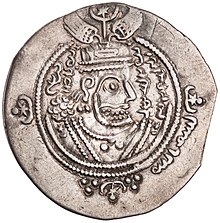Slavery in the Rashidun Caliphate
The slave trade in the Rashidun Caliphate expanded in parallel with the Imperial Early Muslim conquests, when non-Muslim war captives as well as civilians were enslaved, and humans were demanded by tribute and taxation from subjugated people.
The new Empire of the Caliphate expanded to Byzantine Palestine and Syria in the North, Egypt in the West and Persia in the East.
[2] Caliph Umar kept several literary boys from the Caesarea slaves for use as secretaries within the newly established state bureaucratic apparatus, since there was a great lack of people able to write and read in Arabia.
This horrified Aparviz, who, in order to spare the inhabitants of Sakastan from the Arabs, made peace with them in return for a heavy tribute of 1 million dirhams, including 1,000 slave boys (or girls) bearing 1,000 golden vessels.
When Amr ibn al-As conquered Tripoli in 643, he forced the Jewish and Christian Berbers to give their wives and children as slaves to the Arab army as part of their jizya.
The king Kalidurat of Nubia had to submit, and agreed to provide 442 slaves every year to Muslim authorities in Cairo.
The battle was once again inconclusive, because of the Nubian archers who let loose a shower of arrows aimed at the eyes of the Muslim warriors.
While in Pre-Islamic Arabia, Arab war captives were common targets of slavery, importation of slaves from Ethiopia across the Red Sea also took place.
[17] The Red Sea slave between Africa and the Arabian Peninsula continued for centuries until its final abolition in the 1960s, when slavery in Saudi Arabia was abolished in 1962.
During the Rashidun Caliphate, the Arab elite still lived a partially nomadic lifestyle in the Arabian Peninsula, with base in Mecca and Medina.
On one occasion, Caliph Umar ibn al-Khattab (636–644) sold a substantial number of slaves to two elite Qurashis.
[18] Caliph Ali ibn Abi Talib (656–661) were known to manumite slaves on condition that they remain to work on his estates for at least six years afterward.
[23] In the wake of the conquests an elite man could potentially own a thousand slaves, and ordinary soldiers could have ten people serving them.
Free Muslim women were obliged by religious command to veil for modesty in order to avoid sexual harassment: "O Prophet!
[31] Eunuchs was however relatively rare during the Pre-Abbasid period of Islam, since they were for a long time used exclusively within the harems rather than also outside of them, as was to become the case in the Abbasid Caliphate.


